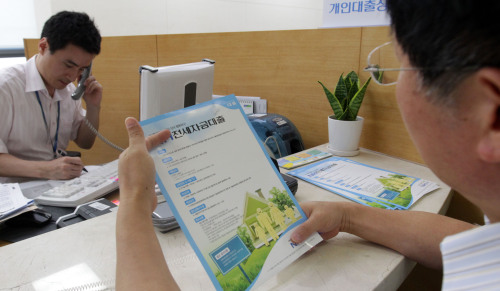Commercial banks have started to reduce household lending under the policy of enhancing risk management against a possible growth in overdue loans.

A client looks a details of a loan at a bank in Seoul on Thursday. (Yonhap News)
Among the banks are Woori, Shinhan and the National Agricultural Cooperative Federation (Nonghyup).
But financial regulators have launched their preliminary probe into Nonghyup as it reportedly halted “all” household loan products on Wednesday.
“We are looking into the background of Nonghyup’s alleged suspension of all household lending,” said an official of the Financial Services Commission.
“Though regulators instructed banks to enhance risk management, full-fledged suspension of household loans could be subject to scrutiny and sanctions.”
Nonghyup saw its household loans surge 800 billion won ($745.6 million) in a month ― from 57.8 trillion won in June to 58.6 trillion won.
Shinhan Bank halted several of the household loan products. “We suspended some parts including credit-based lending to individuals,” a bank spokesman said.
The suspension will go though the end of August, “But we have no plan to halt all household products,” he said.
Woori Bank’s suspended products include housing-collateralized loans and stock-collateralized loans.
Hana Bank is also moving to participate in the move over the coming weeks.
Meanwhile, the FSC denied the speculation that the regulator ordered banks to set the growth rate of household lending at the maximum 0.6 percent.
“The news report is groundless,” an FSC official said. “We have not sent any official letter including the instruction figures to banks.”
Stressing that it is illogical that a bank suspend all household loans, he said that “regulators are just calling for them to push for risk management.”
Snowballing household debts have emerged as a main factor undermining the financial status of the middle- and low-income brackets of the local banking industry.
According to the Bank of Korea, the nation’s household debts surpassed 800 trillion won for the first time during the first quarter of the year.
Outstanding household credit amounted to 801.4 trillion won, up 6 trillion won at the end of March from three months earlier, the central bank reported.
Moody’s Investors Service picked the mounting household debts as one of grave risks that might threaten Korea’s banking industry.
Citing the global rating agency’s report, the Korea Center for International Finance said, “The banking sector has gradually been recovering profitability and quality of assets since the global financial crisis. But the growth in household debts could serve as a risk.”
The nation saw its ratio of disposable income to financial debts rose from 153 percent in 2009 to 157 percent in 2010, while the gross domestic product to household debt ratio has been worsening consistently since 2004.
The KCIF said that that 30 to 40 percent of mortgage loans are for the purpose of investment or consumption rather than actual house purchases.
It emphasized that the situation could pose a problem in the coming years.
The BOK said household lending by local financial companies reached 752.3 trillion won at the end of March, up 6.3 trillion won from the preceding quarter.
By Kim Yon-se
(
kys@heraldcorp.com)

![[AtoZ into Korean mind] Humor in Korea: Navigating the line between what's funny and not](http://res.heraldm.com/phpwas/restmb_idxmake.php?idx=645&simg=/content/image/2024/04/22/20240422050642_0.jpg&u=)
![[Exclusive] Korean military set to ban iPhones over 'security' concerns](http://res.heraldm.com/phpwas/restmb_idxmake.php?idx=645&simg=/content/image/2024/04/23/20240423050599_0.jpg&u=20240423183955)


![[Herald Interview] Why Toss invited hackers to penetrate its system](http://res.heraldm.com/phpwas/restmb_idxmake.php?idx=645&simg=/content/image/2024/04/22/20240422050569_0.jpg&u=20240422150649)
![[Graphic News] 77% of young Koreans still financially dependent](http://res.heraldm.com/phpwas/restmb_idxmake.php?idx=645&simg=/content/image/2024/04/22/20240422050762_0.gif&u=)